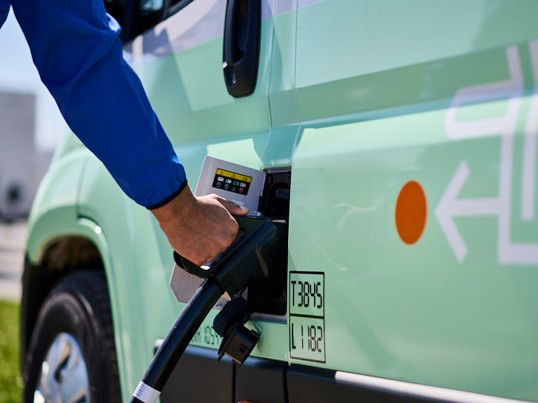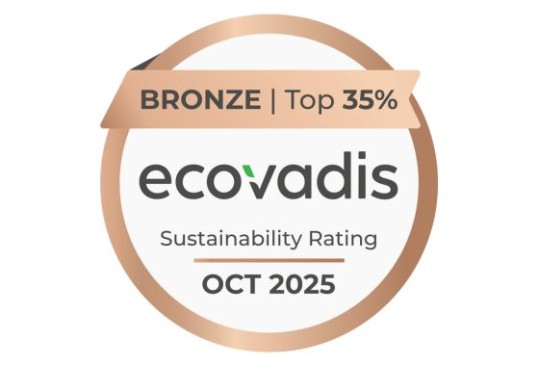Responsibility
Areas of focus
Diversity and inclusion
Our commitment to diversity and inclusion – For the people of today and tomorrow
Diversity and inclusion are key principles at GLS. We recognise that the success of our business depends on the people who work for us regardless of gender, age, sexuality, ethnicity, religion, cultural orientation, physical and mental disability, political and professional activities, among others. Therefore, we are also bias-free in the recruitment process and we recruit applicants with an open mind.
Promoting a diverse and inclusive company culture is not only our ethical responsibility, but also an essential element of the company we want to be. With colleagues from 60 nationalities, we believe we manage to be the diverse company we want to be.
At the same time, we endeavour to give everyone an equal chance, so everything from students to flex workers and seniors work at GLS Denmark. All of them are spread across the country and work every day to connect people and parcels.
Equality
We work actively with equal treatment and equal opportunities for all, including access to courses and training either organised by external providers or in the GLS Academy, general development opportunities and by offering internal job rotation or promotions. Regardless of gender, age, sexuality, ethnicity, religion, cultural orientation, physical and mental disability, political and professional activities, we make room when an employee has the commitment to develop professionally and personally.
In a recruitment process, the applicant's personal circumstances are subordinate. No function in GLS is gender-specific, which is why men and women can apply for exactly the same jobs. This is also reflected in our workforce, where approx. 2/3 are men (68.5%), while approx. 1/3 are women (31.5%)*.
If you divide the workforce into hourly paid (sorting employees) and salaried employees, the statistics look a little different. Just over one in five hourly paid employees are women (22%), while almost four out of five hourly paid employees are men (78%). In percentage terms, there are about twice as many female salaried employees (41%) compared to hourly paid women, while men make up 59% of salaried employees.
The distribution of the workforce, with approx. 2/3 men and 1/3 women, also applies to the managers at GLS. In the management layers, men make up 65.5% and women 34.5%.
*Data is calculated on 31/12-2023
Working conditions
2/3 of our employees in GLS Denmark are hourly paid workers at our depots, who ensure the parcels reach the right recipient with day-to-day delivery. The remaining 1/3 are full-time permanent employees who work with everything from IT to ESG, customer service, business development, sales and operations.
We place great emphasis on nurturing both physical and mental health, so we can take good care of our most important resources.
The annual GAIS wellbeing survey provides insight into overall wellbeing measured on parameters such as mastery, colleagues, leadership and balance. As the survey is conducted annually, we can monitor whether our efforts to create wellbeing and job satisfaction are having the desired effect. In 2024, we have achieved an eNPS of 40, which signals a strong desire to recommend GLS as a workplace.
Seniority says a lot about a workplace. Therefore, we are proud that 10% have been employed between 10-20 years, while 3% have had a 20-year anniversary*. At the same time, we often find that former employees return to GLS, and we are happy to welcome them back.
*Data is calculated for Q1 2024
OHS - A safe work environment
Health and safety is a top priority at GLS. It is essential that everyone gets home from work safely every day. With many heavy parcels and large vehicles, we have an obligation to look after each other.
At GLS Denmark, we have dedicated teams and employees at each of our locations who work hard to prevent work-related injuries, especially with regard to heavy lifting, correct lifting techniques, correct working posture and preventing accidents. We run ongoing campaigns that further emphasise occupational health and safety.
Similarly, we also work with road safety and driver behaviour to ensure that we do not endanger drivers or road users.
Our goal is simple: one work accident is one too many.
Quality in GLS
High quality is a core value and prerequisite at GLS. Whether it's our delivery, sorting, customer service, marketing or internal processes, quality drives us.
Quality is seen in our operations, where we handle millions of parcels every year, 98.9% of which are delivered within 24 hours*. We take our role as a Trusted Advisor seriously, and we set a high standard in our marketing where what we communicate is true and verifiable. When we say we deliver your package day-to-day, we mean it.
And if you need to contact our customer service, you will also experience high quality and short waiting times. 80% of all calls are answered within 2 minutes, while 62% of all written inquiries are answered within 30 minutes and 99% within 8 hours**.
This is also reflected on Trustpilot, where our customers and recipients have made us Denmark's best-rated parcel distributor with a score of 4.7.
*Based on 12 months (April 2023 - March 2024) / **Based on 2023
Compliance
At GLS Denmark, we strive for high quality in everything we do, so for us, safety and security are a natural part of that high quality. Compliance - which means 'adherence to rules' - is an area of great importance to us, as it creates security for our customers and at the same time helps to protect our customers, business partners and ourselves.
We have implemented a programme to identify and avoid compliance risks in a systematic and structured way, focusing on data protection (GDPR), competition law, anti-corruption, anti-bribery and anti-corruption, compliance with financial sanctions, prevention of money laundering and combating forced labour, slavery and human trafficking.
Compliance begins internally and follows a uniform structure across all GLS companies, adapted to national circumstances where necessary. International interaction between the Compliance Managers in the individual GLS countries, the GLS Group's central Compliance department, internal auditing and intensive training for all employees are decisive factors for the continued high quality of the programme.
Requirements for business partners
In order for us to fulfil our high quality requirements, it is a prerequisite that our business partners also perform at a high level. Therefore, we make demands on all our business partners.
At GLS Denmark, we work actively with our partners. Therefore, it is also a requirement that all drivers who distribute parcels for us have a van driver's licence and that all our distribution partners have haulier licences and van licences. The licences and permits require compliance with a number of professional qualifications, behavioural conditions regarding good conduct and good manners, as well as minimum financial limits regarding equity, arrears to the public sector and pay and working conditions.
In order to continuously ensure compliance and increased professionalisation in the industry, GLS Denmark, in collaboration with DTL Danske Vognmænd, is the first to develop a training and auditing programme, which all our distribution partners and hauliers in collaboration with DTL Danske Vognmænd must complete at least every three years.
All drivers affiliated with GLS Denmark are offered ongoing education and training in our internal processes and workflows to maintain and increase the quality of the deliveries they make. In addition, all distribution partners are invited into our operation one day a year to gain an insight into our internal processes and customer enquiries. Similarly, our salaried employees also go out on the road with a driver to get a better insight into distribution.
We believe that this helps to ensure a common understanding of our business and, not least, the service we want to deliver.
Whistleblower
GLS has rolled out a group-wide programme to systematically identify compliance risks and prevent them in a structural manner.
Accessibility Statement
We want everyone to feel at ease when using our website – regardless of individual needs.
That’s why we continuously work to improve accessibility based on the WCAG 2.1 AA standard, ensuring a more intuitive, simple and inclusive experience. Here you can read how we make it easier for everyone to navigate, understand and interact with our digital universe.


